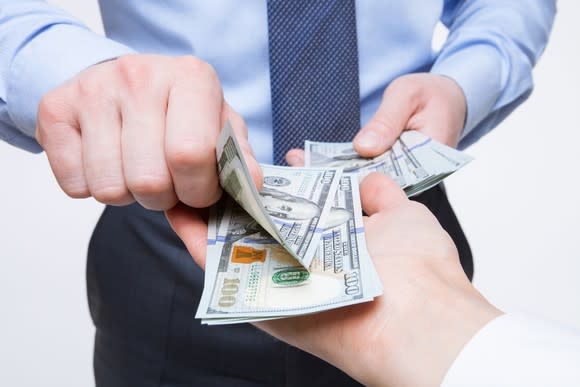3 Dividend Stocks That Pay You More Than Verizon Does
With its dividend yield of 4.9%, few companies can match telecom giant Verizon Communications' (NYSE: VZ) attraction as an income stock. However, there are a handful of dividend payers out there that boast a higher yield and could make better long-term investments.
Want proof? We asked these Motley Fool investors to highlight a dividend stock that pays a higher yield than Verizon. Here's why they picked Tanger Factory Outlets (NYSE: SKT), Cedar Fair (NYSE: FUN), and STORE Capital (NYSE: STOR).

Image source: Getty Images.
An underappreciated retail REIT
Leo Sun (Tanger Factory Outlets): Tanger Factory Outlets owns 44 upscale outlet shopping centers across the United States and Canada. It leases properties to over 3,100 stores that are run by more than 490 companies.
As a real estate investment trust, Tanger is required to pay out nearly all of its profits as dividends. That's why it pays a hefty forward dividend yield of 6.3%, which it's raised annually for 24 straight years. Tanger's payout ratio spiked above 100% over the past year, but that was mostly because of a temporary drop in its earnings caused by remerchandising expenses.
Tanger's stock has fallen nearly 30% over the past 12 months, but the sell-off was mostly due to some misunderstandings about its business. First, Tanger sold off with many brick-and-mortar retailers, on concerns about Amazon.com's ongoing expansion. But Tanger isn't a retailer -- rather, it's a landlord that relies on high occupancy and rental rates. During the fourth quarter, its occupancy rate hit 97.3% as its average rental rates rose 12% annually.
Second, some investors were concerned about Tanger's warning about store closures and a dip in occupancy rates for the current year. Wall Street also expects its sales to stay almost flat this year. That isn't ideal, but analysts still expect its earnings to grow 45% this year as it moves past the remerchandising costs from last year. Though Tanger isn't a high-growth stock, it delivers decent dividends and occupies a defensible niche in the tough retail market.
Buckle up and put your hands in the air
Demitri Kalogeropoulos (Cedar Fair): Attendance at Cedar Fair's parks rose 2% to a new record in 2017, and the company paired that success with a minor uptick in per capita spending that pushed sales higher by 3% for the year. That rate was a touch below the 4% average annual growth that CEO Richard Zimmerman and his team would like to see each year. But it still marked a solid outing for the theme park specialist.
Cedar Fair's most dependable method to attract guests is through the addition of exciting new rides and park zones. And management has big plans for 2018 in that arena. There's a dive coaster called Hang Time set to launch in its Knott's Berry Farm location and a speedy hybrid coaster on deck in its flagship Cedar Point Park. Both parks will have more hotel capacity and additional special events this year, too.
Wall Street expects these additions to help sales growth speed up to a 5% pace in 2018, which should easily cover the 4% rate at which Cedar Fair aims to increase its payout each year. And with its 5.5% yield, that dividend offers a nice cash cushion to help shareholders ride out any volatility in the stock.
An Amazon-proof business model
Brian Feroldi (STORE Capital): Picture this: A company offers a 5% dividend yield, has raised its payout every year since its IPO, has built-in growth potential, is trading at a discount, and its largest shareholder is Berkshire Hathaway. Sound too good to be true? It's not. Let me introduce you to STORE Capital.
STORE -- which stands for "single tenant operational real estate" -- makes money by buying real estate and then leases out its buildings to service-focused retailers.
This might sound like an extremely dicey business to be in right now given the disruption happening in the retail space -- hello, Amazon -- but STORE's financial statements have proved to be remarkably resilient to the changing times. Last year, the company's revenue grew by 20% while AFFO -- which is a REIT proxy for earnings -- grew by 4% per share. Those are solid results when considering how many retailers are closing stores or went belly up last year.
So how is STORE performing so well in these troubled times? The answer lies in its conservative leasing practices. STORE requires its tenants to sign long-term, triple-net lease agreements. This requires tenants to pay for all variable costs out of their own pocket (taxes, insurance, maintenance), which limits STORE's financial exposure. What's more, it primarily focuses on service retail businesses such as restaurants, automotive repair shops, movie theaters, child care centers, fitness centers, and more. These businesses are far more protected from the rise of e-commerce than the average retailer.
This hyperfocus on quality and low-risk leasing terms has allowed STORE to maintain occupancy rates north of 99% for years. This is why STORE's financial statements have continued to flourish in spite of the challenging operating environment.
Looking ahead, STORE still has plenty of room left for future expansion and its built-in rent increases should keep AFFO on the rise. That should lead to dividend increases for the foreseeable future. Meanwhile, the general sell-off in the REIT sector is affording patient shareholders the chance to pick up shares at a 20% discount to their recent high.
More From The Motley Fool
John Mackey, CEO of Whole Foods Market, an Amazon subsidiary, is a member of The Motley Fool's board of directors. Brian Feroldi owns shares of Amazon. Demitrios Kalogeropoulos owns shares of Berkshire Hathaway (B shares). Leo Sun owns shares of Amazon and Tanger Factory Outlet Centers. The Motley Fool owns shares of and recommends Amazon, Berkshire Hathaway (B shares), and Verizon Communications. The Motley Fool recommends Cedar Fair and Tanger Factory Outlet Centers. The Motley Fool has a disclosure policy.
